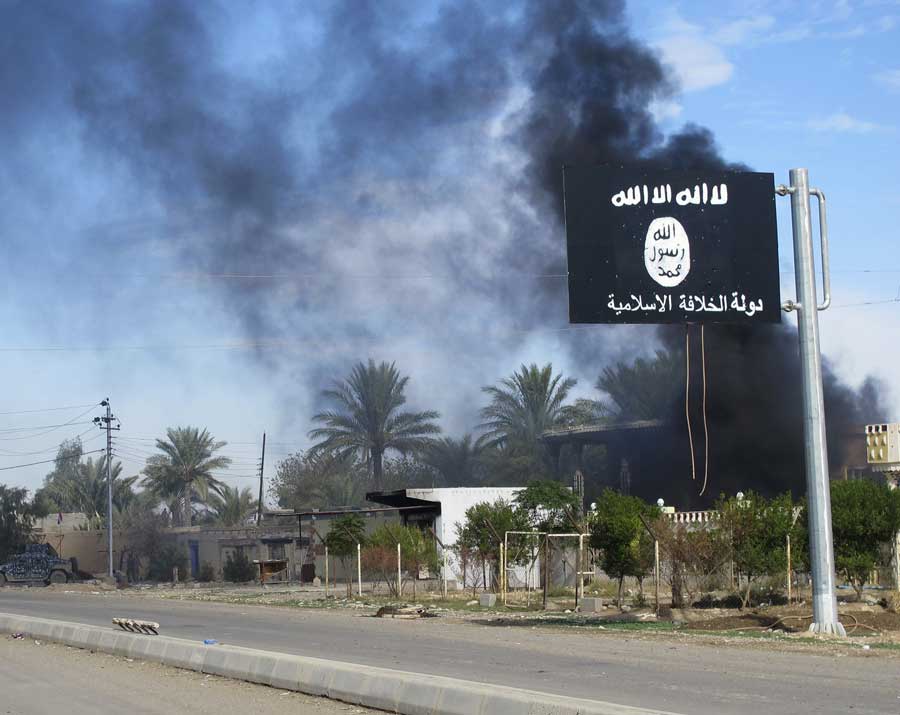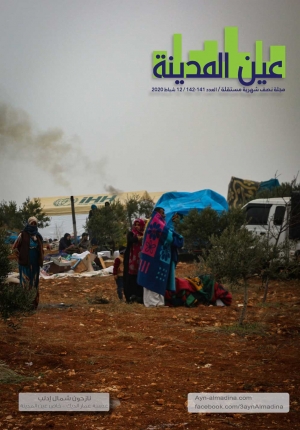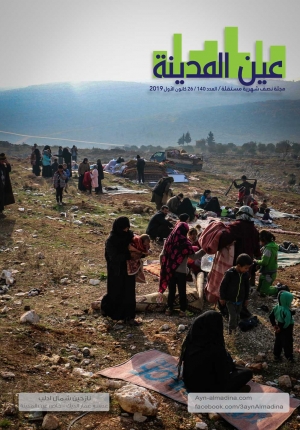Special Report *
The defeats inflicted on ISIS, first in Tal Abyad in June 2015, then in al-Shaddadi and Palmyra in February and March 2016, and recently in the border villages located in the northern countryside of Aleppo, not to mention the defeats in Iraq, are considered to be the most obvious manifestations of the weakness the organization has been suffering from. In addition to these defeats, which can be regarded as a result of the state of weakness and at the same time a cause of this weakness among other causes, the change of ISIS's general discourse from the" mighty State" to the" persecuted State" comes as a sign that confirms that there is such a sharp decline in its strength that it can't rise anew, at least in the short run.
Over the last ten months ISIS has failed to win any great victories over its enemies on both the Syrian and Iraqi fronts despite its determined efforts to achieve that, and despite its urgent and constant need of it. Resorting to penetrating deep into some enemy areas from time to time is considered to be merely desperate and rash attempts that aim at showing off the organization's strength, proving itself to followers and enemies, and demonstrating its ability to make up for losses and avenge itself- quickly and at any time.
The first signs of weakness in ISIS's military structure appeared when it lost distinguished commanders characterized by either a competence proved and tested in battles or courage with magnetizing and influential reputation. The organization was and is still unable to replace killed or seriously wounded commanders with others of the same level, which has driven it to fill the vacant posts of the deceased or wounded commanders with" mubay'yeen"(people who pledge allegiance to the organization) who were merely ordinary fighters belonging to the Free Army or other factions before ISIS control, or even civil activists, or perhaps neutral individuals who missed " the train of the revolution", which stumbled around, whereupon they found that" ISIS's train" offered a rare opportunity for them to rise in status. To get that opportunity, they showed boundless enthusiasm and ingratiated themselves with ISIS's original members. When we look at the names of the present field commanders serving at various fronts in Deir ez-Zour and ar-Raqqa, we find out that some of them were ordinary fighters, relief workers, media activists, neutral people or even loyalists and perhaps volunteer intelligence members. The phenomenon of the dwindling numbers of" professional fighters" wasn't the product of only the phase of weakness, but it also dates back to the days of the full-scale assaults and big territorial expansion in the summer of 2014. According to some leaks confirmed by informed sources within ISIS,s troops diwan(department) in"wilayat al-Khair" (Deir ez-Zour province) , the total number of the organization's fighters killed in Ayn al-Arab/Kobane battles and the subsequent ones in al-Hasaka province exceeded 1800, most of whom were killed in air raids carried out by coalition warplanes on front lines or on ISIS's supply and support routes. Closing the routes along the border between Syria and Turkey has greatly aggravated the organization's problem of shortages of fighters of quality and deprived it of the artery that used to provide it with war veterans who had acquired experience by fighting in another theatre of war, and fighters who had been born and bred in jihadist environments in Chichen and Afghnistan or in Central Asia and the South-East of Asia. According to a source close to officials responsible for receiving emigrants arriving at Syrian territory, no new comer has arrived at the homes and buildings prepared for emigrants in the last five or six months. Contrary to expectations, there have been male and female emigrant deserters or defectors who left for Turkey then surrendered themselves to the embassies of their own countries. If the news circulated among a limited number of the Free Army security men is true- it is probably believable- the numbers of those who are desirous and ready to defect when there are favorable circumstances have been increasing steadily owing to the disappointment they feel and the shattering of their illusions about the virtuous and powerful "State of Muslims". On the other hand, the absence of new emigrants has led to depriving ISIS of a propaganda material that used to help the organization's officials and followers to talk with pride about people who abandoned the pleasures of life in their original countries an emigrated to the "State of Islam" aiming at defending it and dying for its survival. Inevitably, ISIS's propagandists will not find a local example to give in the context of seducing Syrian Muslims into pledging allegiance to the organization although others look enviously at the geographical advantage that has allowed them to be – by chance – in the "State of Islam", which others sacrifice everything and take risks for the sake of arriving at. The absence of concrete propaganda such as that about emigrants will deprive ISIS of recruiting new principled volunteers to its ranks.
The rates of recruiting locals are the same as before, especially among children and adolescents, who are the favorite age group for the organization's leaders as it is easy to influence them, and what's more there are sufficient numbers of them in communities where there are huge numbers of youths and men who are absent or have fled from the abuse of ISIS itself. However, the organization is suffering from a shortage of full time fighters, which appears in some wilayas every time the organization mobilizes its forces and makes preparations for major battles, particularly in the last months. To overcome this problem, the organization's military officials resort to the random massing of members working within its civilian apparatuses. The large numbers of local non- military loyalists and teenagers and children killed and wounded in action show the increased reliance of ISIS on these two groups, and its inability or indifference towards its growing human losses in general. Apart from relying on children and non- military loyalists,ISIS has been trying, since the beginning of this year, to widen the circle of people in the communities under its control whom it aims at recruiting. To achieve this, the organization has started to renew its relations with these communities, and to establish some common ground that depends on mutual interests. Therefore, ISIS, represented by the department of public relations and tribes, has been trying to woo the sheikhs and notables of tribes in Deir ez-Zour and ar-Raqqa in one way or another. It sometimes courts some of those tribal figures by holding a lot of meetings with them and releasing dozens of detainees from its jails. It held two tribal meetings in the towns of Theeban and Hwayj Thiab east and west of Deir ez-Zour, and another two meetings in the headquarters of the department of tribes in ar-Raqqa and in the town of Huzaymah east of ar-Raqqa. At the meetings, ISIS's officials talked to those present in a friendly tone that was devoid of arrogance and pride. Their talks were centered on explaining what it meant "to be in the same boat"," the boat" that carried them all: "the Islamic State" and its subjects in Deir ez-Zour, ar-Raqqa, and the whole" territory of Muslims". If that boat sank, not only the" State" but also all Muslims would drown; according to ISIS's talks, no one attempting to escape by jumping from the boat would reach a place of safety; enemies wouldn't show any discrimination in treating Muslims as they target not only the "State" but also all Muslims. To prove that point of view, ISIS focuses on some racist practices perpetrated by the ypg militia (the Kurdish People's Protections Units) against the inhabitants of Arab villages and towns in al-Hasakah and ar-Raqqa. It is true that some racist practices such as arbitrary and random detention, and razing villages and clearing them have been perpetrated, but the motives behind them are different from what ISIS alleges. In the Iraqi communities under its control, ISIS adopts the rhetoric it uses in Syria. It asks the Sunni communities to remember the previous sectarian deeds perpetrated by al-Maliki Shiite government, and the renewed deeds perpetrated against Sunni " Muslims" by " the Popular Mobilization" militia. At the meetings, ISIS's speakers, who highlighted" the danger of the Kurds", asked the sheikhs and notables of tribes to stand up for the " State" by encouraging and urging their sons to pledge allegiance to it and to have a strong presence at the fronts. ISIS acts like the Assad regime, which gives the world two options: either al-Assad or terrorism. It gives the communities under its control two options: either It or the Other, who is entirely hostile to the Islamic faith and aims, and poses a danger to the religion and the chances of survival by killing and displacing Muslims. To complement what the officials in the department of public relations and tribes had started, ISIS's security men held closed meetings with the representatives of each tribe in private. At these meetings, security men repeated the same demands, and offered their listeners seductions and advantages if they agreed to these demands. They also pledged to solve the unsettled cases and punish the organization's bad figures and elements.
This report appeared in issue 71 *
Translated by Fayez Masri


 Fayez Masri
Fayez Masri



